Beware: Paper Water is coming to a tap near you!
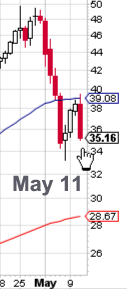
A week ago, 8 people gathered in a room, each holding a 1-oz silver coin in their hands and some cash in their pockets. Some wanted to sell their silver, while others wanted to buy more of the same. After negotiations, they agreed to exchange silver for cash at $48 an ounce. Five coins changed hands for a total value of $240. Transactions completed, everyone was happy, and they left for a 1-week holiday.
In a second room in a far away place, 8 gamblers sat around a table and started placing bets with each other over the price of silver being transacted in the first room. Being gamblers, they didn’t just place 1 bet each and go away. Afterall, if they won that bet, how much could they make? Every Monday to Friday, they sat around from 8.00am to 1.30pm repeatedly placing bets upon bets and typically end each day with thousands of bets placed worth millions of dollars, but not a single ounce of silver changed hands. Yesterday, the gamblers ended their day with the last bet done at $35.16 an ounce. In fact, they even betted on what the price will be next month, and for every other month all the way to December 2015. Incidentally, their closing bet was $34.328 for December 2015′s price.
Today, if you and I decided to trade some silver coins between us, should we use the last transacted price from the traders in the first room or the last betting price from the gamblers? When the 8 traders return from their holiday and started trading again today, should they start negotiating around $48 or $35.16 or $34.328?
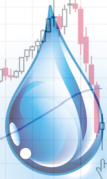
Paper Water
Welcome to our civilised, modern, high-tech world of derivatives and futures trading. It’s a world where the tail wags the dog. A world where the virtual controls the physical. And if you think this is ridiculous, think again!
If they could do that with silver (and gold, corn, live cattle, oil, etc), why not bet on water as well? Yes, H20. The colourless liquid from our taps, from the wells in Africa, from the rain, in the lake, in aquifers underground - this commodity can be traded on futures exchanges just like all other commodities. The same group of Wall Street bankers can trade Paper Water, Water Derivatives, Water Futures, maybe CWO (Collateralized Water Obligations). Watch out! Paper Water is coming to a tap near you - Nestle: Water trade part of answer to feeding world
Tues, May10
GENEVA (Reuters) -Selling water on exchanges in the same way other commodities are traded could help solve a shortage of the world’s most precious raw material likely to hit long before oil runs dry, the chairman of Nestle said on Tuesday.
“I am not against the idea,” Peter Brabeck, chairman of the world’s largest food group, told Reuters when asked about the idea of exchange-based water trade.
As always, these Wall Street elites are always thinking of clever ways to solve humanity’s ever increasing problems. Water certainly is scarce commodity, and the way to solve that, according to Nestle, is to create more water - Paper Water. Perhaps Nestle based their Paper Water idea on Mr. Christian, head of the CPM Group’s famous statement “they trade in the multiples of a hundred times the underlying physical”. Voila! With the stroke of a pen, just like gold and silver, we could create multiples of a hundred times more water!
Referring to how oil futures control the price, and hence demand for oil, Peter Brabeck went on to say:
One thing that does not move at all is the price of water.
That’s because there’s no Paper Water yet. Once that has been created in the NYMEX, perhaps by Nestle, the price of water will move, and move it will - according to Paper Water, in the direction, by the amount and at the time of their choosing.
-

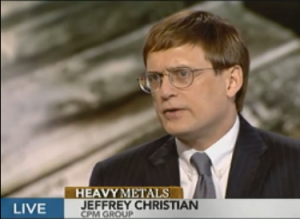
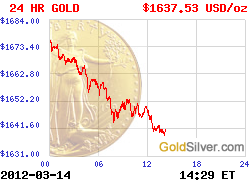
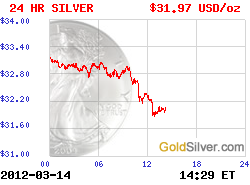
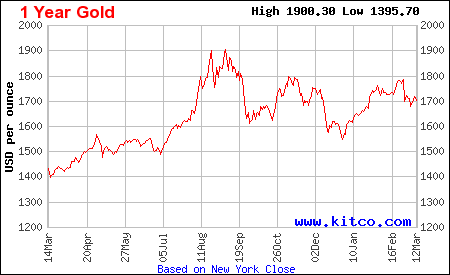 More Charts: 1-Month, 1-Year, 5-Year, 10-Year
More Charts: 1-Month, 1-Year, 5-Year, 10-Year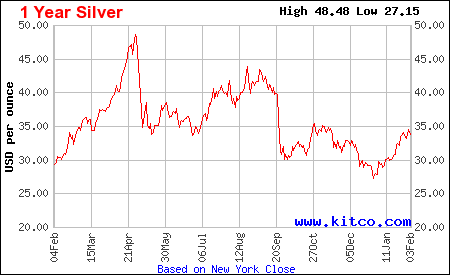 More Charts: 1-Month, 1-Year, 5-Year, 10-Year
More Charts: 1-Month, 1-Year, 5-Year, 10-Year